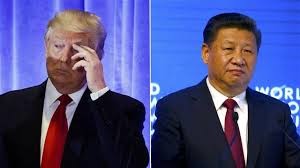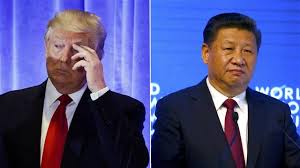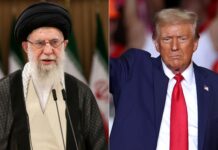 BEIJING: The US and China’s top economic officials agreed by phone today to “continue to communicate” on trade issues, Chinese state media said, as President Donald Trump pledged his escalating trade showdown would get results despite pushback from Europe and Beijing.
BEIJING: The US and China’s top economic officials agreed by phone today to “continue to communicate” on trade issues, Chinese state media said, as President Donald Trump pledged his escalating trade showdown would get results despite pushback from Europe and Beijing.
In his latest jolt to the prevailing global order, Trump on Thursday authorized tariffs on as much as USD 60 billion of Chinese imports, targeting sectors in which Washington says China has stolen American technology.
Liu He, the Chinese vice premier in charge of the economy, told US Treasury Secretary Steven Mnuchin today that Beijing was “ready to defend its national interests” but hoped that “both sides will remain rational and work together,” according to China’s official Xinhua news agency.
He also accused a US probe into Chinese intellectual property practices of violating international trade rules.
China had warned the United States yesterday that it was “not afraid of a trade war” as it threatened tariffs on USD 3 billion worth of US goods in retaliation. And French President Emmanuel Macron said Europe would respond “without weakness” to Washington’s threats of tariffs on steel and aluminum.
“Nothing should be addressed when it is with a gun to your head,” he said at the end of an EU summit in Brussels.
Global stocks have plummeted as fears rise that the confrontation could provoke a damaging trade war. Meanwhile, World Trade Organization Director-General Roberto Azevedo called for cooler heads to prevail, saying in a statement that new trade barriers would “jeopardize the global economy”.
But speaking to reporters yesterday as he signed new budget legislation, Trump said his efforts were beginning to bear fruit.
Washington this week said it would temporarily exempt Europe as well as countries including Brazil, Argentina, South Korea and Australia from the steep new steel and aluminum tariffs that Trump unveiled this month and which took effect yesterday.
European and US trade officials said this week they were beginning talks to reach a compromise.
“Many other countries are now negotiating fair trade deals with us,” Trump said Friday.
“Part of the reason, frankly, that we’re able to do that is the fact that we have the tariffs on steel and the tariffs on aluminum.”
Meanwhile, US Commerce Secretary Wilbur Ross said yesterday that US and South Korean officials were “relatively close” to reaching a deal on the steel and aluminum tariffs, with an announcement possible as early as next week.
But Beijing yesterday also unveiled a hit list of products that could face duties of up to 25 percent, from fresh fruit to pork and wine, though it stopped short of pulling the trigger as it indicated its readiness to negotiate an agreement.
China’s commerce ministry warned that a 15 per cent tariff on 120 goods worth almost USD 1 billion – including fresh fruit, nuts and wine – would be imposed if the US fails to reach a “trade compensation agreement” within an unspecified time frame.
In a second step, a 25 percent tariff would be imposed on eight goods totaling nearly USD 2 billion, including pork and aluminum scrap, after “further evaluating the impact of the US measures on China,” the statement said.
“China does not want to fight a trade war, but it is absolutely not afraid of a trade war,” the commerce ministry said.
The list noticeably does not include soybeans, a key US export from Trump-voting states that Chinese state-run newspaper the Global Times had suggested should be targeted by Beijing.
Betty Wang, an economist at ANZ bank, said China’s reaction was “relatively mild.”
“From China’s perspective, it absolutely does not want to see a trade war. Coming back to the negotiation table is a relatively good result,” Wang said.
The United States had a record USD 375.2 billion goods trade deficit with China last year.
Senior White House economic advisor Everett Eissenstat said Thursday the new US import duties would target sectors where “China has sought to acquire an advantage through the unfair acquisition or forced technology transfer from US companies.”
US Trade Representative Robert Lighthizer indicated the industries could include aerospace, maritime and rail transport equipment, and new energy vehicles.
Trump’s order also directs the US Treasury to develop new proposals to increase safeguards against Chinese investments in the US that could compromise national security.-AFP







